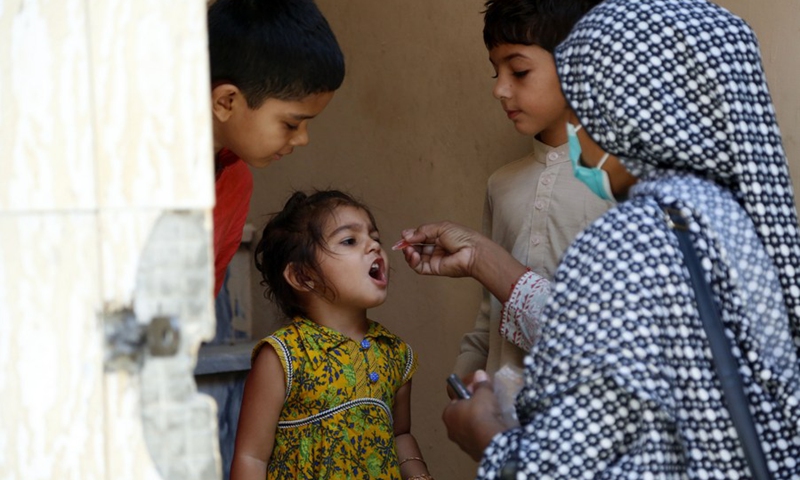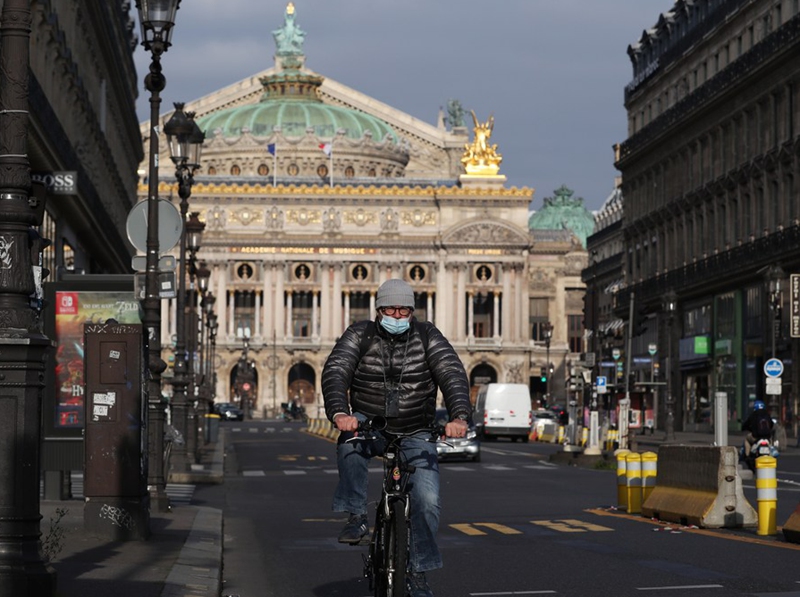OECD estimates better global growth on vaccine progress
Source: Xinhua Published: 2020/12/3 13:03:25

A health worker gives polio vaccine to a child during a door-to-door polio vaccination campaign in Rawalpindi of Pakistan's east Punjab province on Sept. 22, 2020. (Photo: Xinhua)

An exhibitor displays fans during the sixth Shanghai international hobby craft expo at Shanghai World Expo Exhibition and Convention Center in east China's Shanghai, Nov. 27, 2020.(Photo: Xinhua)

A man wearing a face mask rides a bike in front of the Paris Opera in Paris, France, Nov. 25, 2020.(Photo: Xinhua)
The Organization for Economic Cooperation and Development (OECD) on Tuesday painted a "brighter" picture for a faster global recovery as progress in anti-coronavirus vaccine and strong recovery of Chinese economy have provided relief.
In its Economic Outlook report released on Tuesday, the OECD projected the pandemic to slash the world economy by 4.2 percent this year, better than a previous estimate of 4.5 percent contraction.
For next year, the OECD forecasted the global growth "to gain momentum only gradually, as vaccines are deployed throughout OECD countries in the course of 2021."
World GDP is projected to rise by 4.2 percent and reach pre-pandemic level by the end of next year, with China expected to account for over a third of the world economic expansion.
"The recovery will be uneven across countries and sectors and could lead to lasting changes in the world economy," said the Paris-based organization.
"Countries with effective testing, tracking and isolation programs and where effective vaccinations can be distributed rapidly should perform relatively well, but a high degree of uncertainty persists," it said.
China is expected to post a 1.8-percent growth in 2020, the only major economy to record positive performance. The figure would jump to 8 percent in 2021 before slowing to 4.9 percent a year after.
In the United States, GDP would contract by 3.7 percent this year, then grow by 3.2 percent and 3.5 percent in the next two years; the eurozone would have a 7.5-percent contraction in 2020 before growing by 3.6 percent in 2021 and 3.3 percent in 2020, according to the report.
"There is hope, but that hope needs to be turned into reality. The pandemic is a global problem. International co-operation is needed now more than ever," said OECD Secretary-General Angel Gurria when presenting the outlook.
"Building back better requires leadership and action to build on the promises of vaccines, and to relaunch multilateral negotiations on trade, climate and digital standards to pave the way for a more sustainable growth and a society where opportunities are available for all," he added.
"With the prospect of vaccines and better virus management, the picture for the global economy is looking brighter, but the situation remains precarious, especially for the low-skilled and for struggling small businesses," said OECD Chief Economist Laurence Boone.
With the aim, the OECD recommended that "exceptional spending" the governments have provided to mitigate the economic fallout of the health crisis "should continue until the recovery gains momentum."
"The balance of spending should gradually move towards more investment in health, education and infrastructure, encouraging a shift to a greener and more digitalised economy," it added.
Posted in: ECONOMY